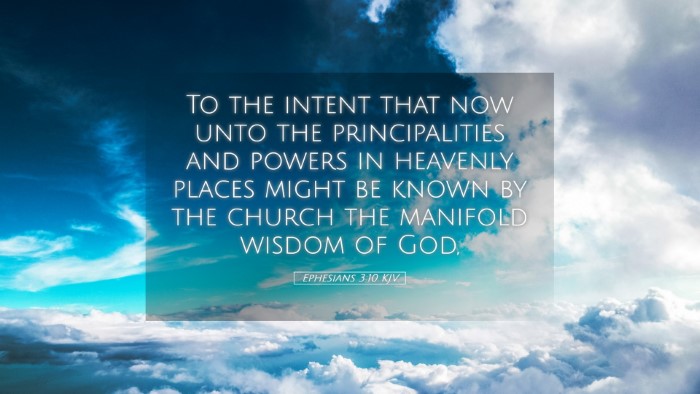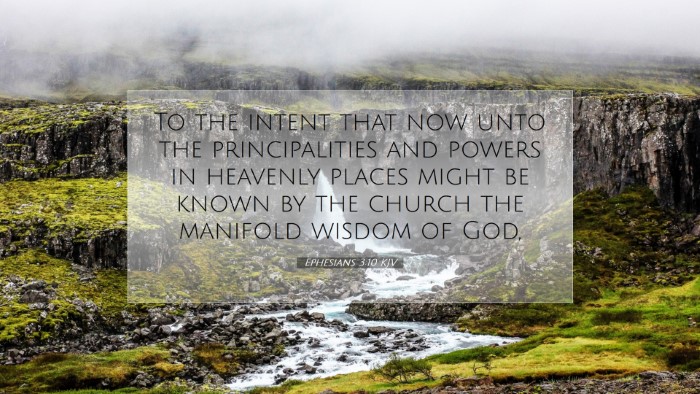Ephesians 3:10 - A Comprehensive Commentary
Ephesians 3:10 states, "To the intent that now unto the principalities and powers in heavenly places might be known by the church the manifold wisdom of God." This verse illuminates the purpose of the Church in revealing God's multifaceted wisdom to spiritual authorities. Below, we explore various insights from renowned commentators.
Contextual Overview
This passage is situated in the broader context of Paul’s epistle to the Ephesians, which emphasizes the Church as the Body of Christ and highlights the mystery of the Gospel. In preceding verses, Paul elaborates on his mission to the Gentiles and the revelation of God’s purposes through Christ.
Insights from Matthew Henry
Matthew Henry notes that this verse reflects how God’s wisdom is manifold, varied, and profound. He posits that the Church serves as God's instrument to demonstrate His wisdom not merely to humanity but to celestial beings.
- Divine Purpose: Henry emphasizes that God's intention was to manifest His wisdom through the Church, indicating that believers play a crucial role in God's divine plan.
- Spiritual Realities: The mention of 'principalities and powers' refers to celestial hierarchies. Henry suggests that through the Church’s existence and witness, even angels comprehend more profoundly the wisdom of God.
- Manifold Wisdom: The term 'manifold' suggests diversity; it encompasses God's attributes that can be perceived in various ways—His grace, justice, mercy, and love.
Insights from Albert Barnes
Albert Barnes elucidates the implications of the Church’s role as a venue of divine revelation to the orderly structures of heaven.
- Task of the Church: Barnes emphasizes that the primary task of the Church is to reveal God’s wisdom. This wisdom is not only confined to humanity but extends its implications to the entire spiritual realm.
- Cosmic Fulfillment: The verse asserts that the Church fulfills a role that connects heaven and earth, suggesting that the redemption story has cosmic import.
- Heavenly Witness: Reflecting on 'principalities and powers', Barnes points out that they serve as witnesses to the unfolding drama of salvation, observing the Church’s testimony of God’s glory.
Insights from Adam Clarke
Adam Clarke provides a detailed analysis that connects the theological and practical aspects of this verse.
- Revelation of God: Clarke asserts that God wants to reveal His wisdom not just to humans but also to spiritual beings, reinforcing the significance of the Church’s mission.
- Implications for Believers: He stresses that every believer is a part of this grand narrative, encouraging them to recognize their role in manifesting God's wisdom to the world and beyond.
- Unity in Diversity: The Church, with its varied gifts and members, showcases the multifaceted nature of God’s wisdom, highlighting the beauty found in diversity united in Christ.
Theological Implications
The theological implications of Ephesians 3:10 extend beyond mere intellectual understanding; they call for practical application in the life of the Church.
- Understanding God's Plan: Believers are invited to explore the depths of God’s plan, which is continually unfolding throughout history.
- Encouragement for Evangelism: The Church must act as a beacon of God’s wisdom, motivating believers to engage in evangelism and mission, knowing their actions reflect divine wisdom.
- Worship and Reverence: Recognizing the weight of this call inspires awe and enhances worship, knowing that through the Church, spiritual beings receive a glimpse of God's greatness.
Conclusion
Ephesians 3:10 serves as a profound reminder of the Church's unique position in the cosmos. Through the insights provided by Henry, Barnes, and Clarke, we understand that God's manifold wisdom is revealed through the collective witness of believers. This understanding should inspire pastors, students, and theologians to engage more deeply with their roles within the Church, recognizing the broader implications of their faith and outreach.


